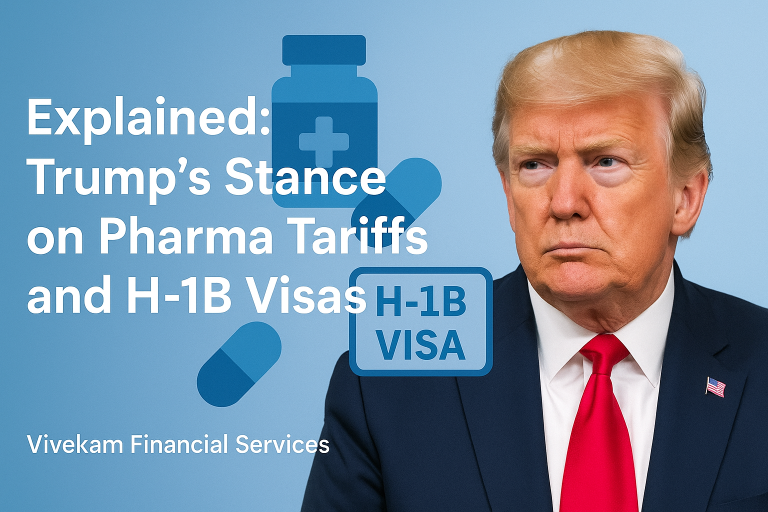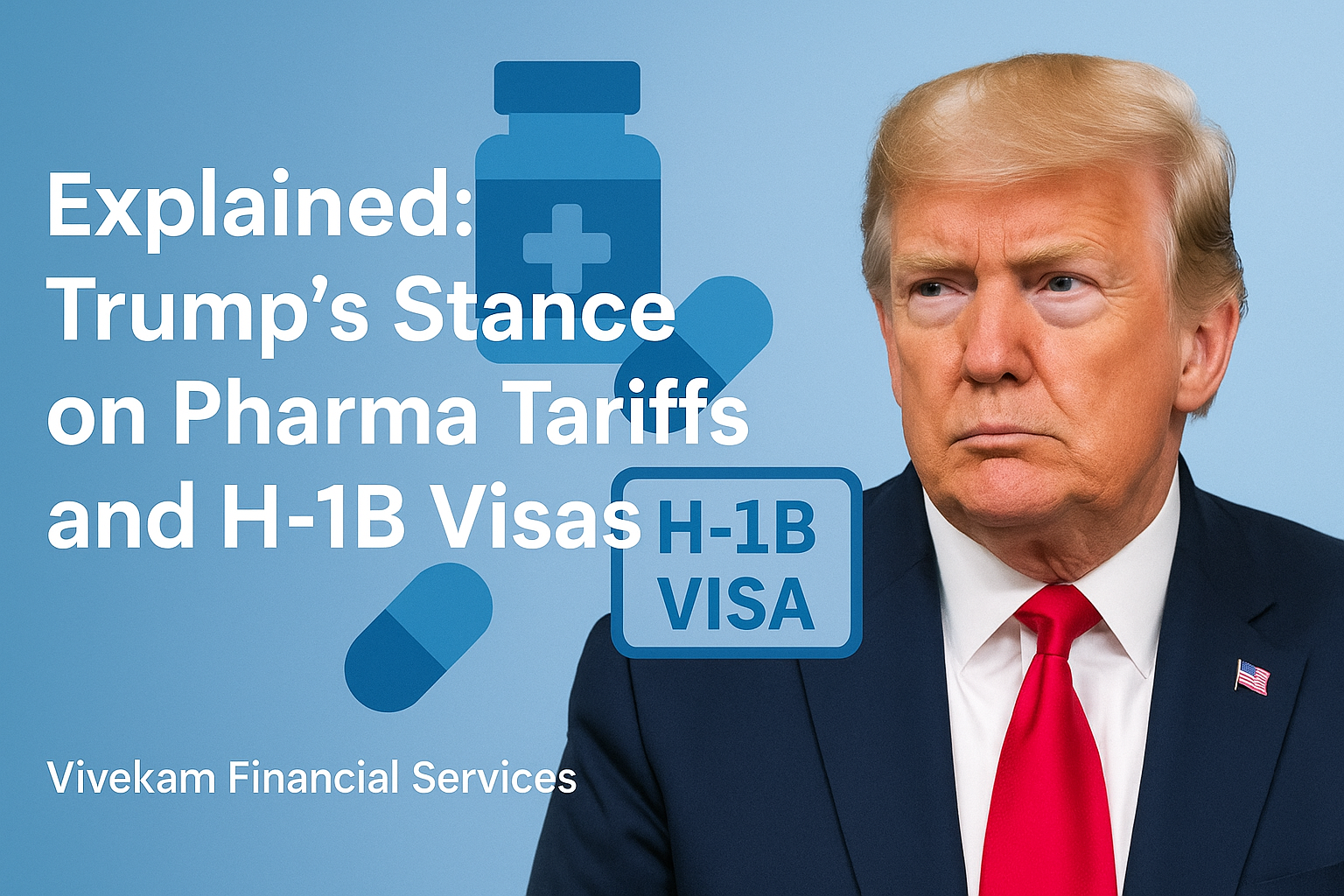Trump’s Stance on Pharma Tariffs and H-1B Visas

Introduction: Why Trump’s Policies on Pharma and Immigration Matter
Few political issues stir as much debate as Donald Trump’s “America First” agenda. His approach to pharma tariffs and H-1B visas touches two critical arteries of America’s economy: healthcare and technology. On one hand, he’s fighting to cut foreign dependency for life-saving drugs; on the other, he’s slamming the brakes on the pipeline of global tech talent. These choices ripple through boardrooms, laboratories, and households alike. Understanding Trump’s playbook here is key to predicting America’s future in both health security and innovation.
Background on Trump’s Economic and Immigration Agenda
“America First” Philosophy and Its Impact on Trade
Trump’s philosophy is simple: make more in America, buy less abroad. From steel to cars to pills, tariffs became his hammer, and foreign imports were the nail. His argument? Global supply chains leave the U.S. vulnerable in times of crisis.
Trump’s History with Immigration Reforms
Immigration, particularly skilled immigration, was another pressure point. Trump believed the H-1B system was being gamed by corporations, undermining U.S. workers. What emerged was a skeptical, protectionist lens applied to visas, reshaping how companies staffed their engineering and IT teams.
Trump’s Position on Pharma Tariffs
Rationale Behind Pharma Tariffs
Strengthening Domestic Manufacturing
Trump pitched pharma tariffs as a patriotic necessity: bring drug manufacturing home, revive forgotten factory towns, and reduce reliance on foreign labs.
Reducing Dependency on China and India
COVID-19 laid bare America’s dependence on India and China for active pharmaceutical ingredients (APIs). Trump’s solution? Punish imports, reward domestic production.
Potential Benefits of Pharma Tariffs
Job Creation in the U.S.
Tariffs could kickstart pharma manufacturing jobs, giving local economies a shot in the arm.
Supply Chain Security
A homegrown supply chain means fewer geopolitical choke points. For Trump, that’s leverage and insurance rolled into one.
Possible Risks and Industry Pushback
Higher Drug Costs for Consumers
Critics warn tariffs would make prescriptions pricier. Great for U.S. factories, not so great for patients picking up their monthly meds.
Resistance from Pharmaceutical Lobbyists
Big Pharma, with its global profit margins, isn’t thrilled. Lobbyists warn tariffs will hurt innovation and bog down R&D budgets.
Trump’s Stance on H-1B Visas
What Are H-1B Visas and Who Benefits from Them?
H-1Bs are the golden ticket for skilled foreigners—engineers, doctors, scientists—who drive America’s tech and research engine. Silicon Valley thrives on them.
Trump’s Criticism of the H-1B System
Concerns About U.S. Worker Displacement
Trump framed the system as a backdoor for cheap labor, hurting American workers and wages.
Outsourcing and Tech Industry Abuse
Consulting firms, especially from overseas, were accused of exploiting the program—placing workers in the U.S., then shipping work back abroad.
Reforms Proposed by Trump
Preference for Highly Skilled Workers
Trump wanted fewer “average” applicants, more top-tier talent. His vision: visas only for the exceptional.
Scrutiny of Visa Applications
By the end of his term, H-1B approvals had turned into a gauntlet. Denials spiked, leaving companies scrambling.
Comparing Trump’s Policies with Previous Administrations
Pharma Tariffs Under Obama and Biden
Obama and Biden both leaned on global partnerships rather than tariffs. Biden’s approach has been to incentivize, not punish—subsidies, grants, and investments in U.S. drug manufacturing instead of levying tariffs.
Immigration Policy Shifts Pre- and Post-Trump
Bush and Obama saw H-1Bs as tools to attract global talent. Trump broke from tradition, painting the system as rigged. Biden has tried to soften the edges, restoring predictability without dramatically raising caps.
Economic and Political Implications
Impact on Global Trade Relations
Tariffs risk turning trade partners into trade adversaries. India and China—both central to pharma supply chains—wouldn’t hesitate to retaliate.
Effect on the U.S. Job Market
Tightened H-1B rules may boost U.S. job opportunities short-term, but long-term, they risk bottlenecking innovation. The U.S. economy needs both homegrown workers and imported expertise.
Reactions from Key Stakeholders
Pharmaceutical Companies
Pharma giants warn tariffs are a recipe for higher costs and slower innovation. They’d rather keep supply chains global.
Tech Giants and Startups
Silicon Valley has been blunt: no visas, no innovation. From Google to garage startups, leaders insist foreign talent fuels America’s tech dominance.
American Workers vs. Foreign Talent
Blue-collar and white-collar divides emerge. Some American workers cheer stricter visa policies, while others in high-skill sectors fear a talent drought.
Case Studies and Real-World Examples
How Pharma Tariffs Affected U.S. Drug Prices
When Trump floated higher tariffs, analysts predicted drug prices could jump by double digits. Companies considered shifting operations but braced for consumer backlash.
H-1B Visa Denials During Trump’s Tenure
By 2019, nearly 1 in 3 H-1B applications was denied. Canada saw a surge in U.S.-trained engineers who simply moved north, fueling Toronto’s rise as a tech hub.
Future Outlook: What to Expect If Trump Wins Again
Predictions for the Pharma Industry
Expect tariffs back on the table, coupled with promises of new U.S.-based plants. Consumers, however, may pay more unless subsidies cushion the blow.
The Future of Skilled Immigration
Another Trump term likely means tighter H-1B scrutiny, but with carve-outs for elite talent. Translation: Silicon Valley might keep its geniuses, but lose its bench strength.
FAQs on Trump’s Stance on Pharma Tariffs and H-1B Visas
Q1: Why does Trump support pharma tariffs?
He sees them as a tool to re-shore drug production and cut reliance on foreign suppliers.
Q2: Will pharma tariffs make medicines more expensive?
Yes. Domestic production is costlier, so consumers would likely see higher prescription costs.
Q3: Why is Trump critical of H-1B visas?
He believes they undercut U.S. workers by giving companies access to cheaper foreign labor.
Q4: How did H-1B visa approvals change during Trump’s presidency?
Denial rates soared, peaking at about 30% in 2019.
Q5: What do tech companies think about Trump’s H-1B stance?
They oppose it, arguing that foreign talent is critical for innovation and competitiveness.
Q6: What might happen if Trump wins another term?
Expect tariffs on pharma and tightened H-1B approvals, with exceptions for top-tier talent.
Conclusion: Balancing Protectionism and Global Competitiveness
Trump’s twin policies on pharma tariffs and H-1B visas highlight the friction between national security and global integration. His approach promises resilience and domestic jobs but risks higher costs and reduced access to global talent. Whether this strategy strengthens America—or sidelines it in a global race for innovation—depends on how far voters are willing to embrace protectionism over openness.







